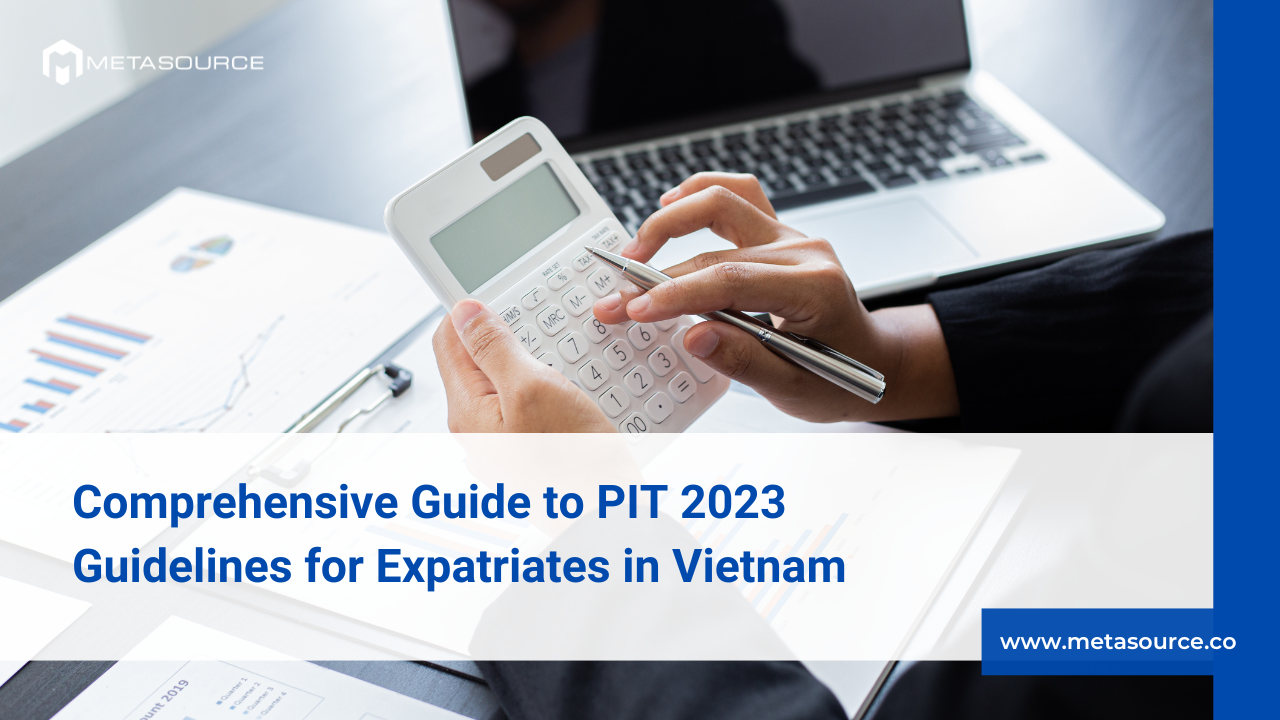Navigating tax obligations in a foreign country can be daunting, and Vietnam’s Personal Income Tax (PIT) system is no exception. Designed to be comprehensive, it encompasses a range of income types and taxpayer statuses, directly impacting expatriates living and working within its borders. This guide aims to simplify the PIT framework for 2023, focusing on key areas such as residency status, tax rates, deadlines, and essential tips for expatriates.
I.Understanding PIT in Vietnam
Personal Income Tax (PIT) in Vietnam is a direct tax levied on the income of individuals, applying to various income sources including wages, business profits, and investments. For expatriates, understanding the nuances of PIT is crucial to ensure compliance and optimize tax liabilities.
II.Residency Status: The Determining Factor
The determination of one’s tax obligations in Vietnam significantly hinges on their residency status, which classifies taxpayers into two distinct categories:
Tax Residents:
- Defined as individuals present in Vietnam for 183 days or more within a calendar year or a consecutive 12-month period from the date of entry.
- Those with a registered permanent residence or a rental agreement exceeding 183 days in Vietnam also qualify.
- Tax residents are subject to PIT on their worldwide income, necessitating a comprehensive understanding of taxable income and applicable deductions.
Non-Tax Residents:
- Individuals not meeting the criteria for tax residency are classified as non-tax residents, facing tax only on their Vietnam-sourced income.
- A critical aspect for non-tax residents is the requirement to demonstrate tax residency in another country to avoid being deemed a tax resident by default in Vietnam.
III. PIT Rates for Expatriates
The PIT rates for expatriates in Vietnam are delineated based on residency status, with tax residents encountering progressive rates and non-tax residents subjected to a flat rate on their Vietnam-sourced income.
| Income Bracket (VND) | Tax Rate for Tax Residents | Tax Rate for Non-Tax Residents |
| Up to 60 million | 5% | 20% (flat rate on sourced income) |
| 60 – 120 million | 10% | |
| 120 – 216 million | 15% | |
| 216 – 384 million | 20% | |
| 384 – 624 million | 25% | |
| 624 – 960 million | 30% | |
| Above 960 million | 35% |
This table serves as a general guideline, with actual rates and brackets subject to annual adjustments by the Vietnamese government.
Taxable Income for Residents and Non-Residents:
- All forms of income, including wages, business profits, and investment returns, fall within the ambit of taxable income.
- It’s imperative for expatriates to accurately assess their income streams to ascertain their tax liabilities.
Deductions and Allowances:
Tax residents benefit from deductions for dependents and various allowances that effectively reduce their taxable income, highlighting the importance of understanding these provisions for tax optimization.
IV. Compliance Deadlines and Procedures
Timely compliance with tax filing and payment deadlines is critical to avoid penalties and ensure smooth financial operations in Vietnam.
Tax Year and Filing Deadlines:
- The Vietnamese tax year coincides with the calendar year, ending on December 31st.
- Expatriates are required to file their annual tax returns and finalize their tax payments by March 31st of the following year.
Finalisation Methods:
Expatriates can opt to file their taxes directly with the Vietnamese tax authorities or through authorized agents, such as their employers or professional tax advisors. This flexibility accommodates different employment and residency circumstances, underscoring the need for expatriates to understand their best approach to tax finalization.
V. Practical Tips for Expatriates
To navigate Vietnam’s tax system effectively, expatriates should consider the following practical tips:
- Early Residency Status Determination: Identifying whether you are a tax resident or non-tax resident at the outset can significantly influence your tax planning strategy.
- Meticulous Record-Keeping: Maintain comprehensive records of all income, tax payments, and relevant documents, such as contracts and residency proofs, to support your tax filings.
- Leverage Deductions and Allowances: Explore all available deductions and allowances to minimize your taxable income, thereby reducing your overall tax liability.
- Adhere to Deadlines: Ensure that all tax filings and payments are completed within the stipulated deadlines to avoid unnecessary penalties and interest.
- Seek Expert Advice: The complexities of Vietnam’s tax laws warrant professional guidance
Read more: Navigating the Complexities of Obtaining a Working Permit in Vietnam
Read more: How To Register A Limited Liability Company In Vietnam A Quick Guide
Discover more tips to help boost your business further in Vietnam by following us on our website and Linkedln page


